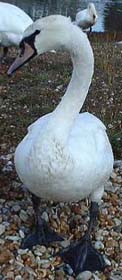
ELECTRONIC
NEWS
BULLETIN
FOR
THE
| News & Events |
| Wildlife Reports |
| Words of the Week |
| Historical Snippet |
| Advertisements |
If
you wish to receive this Bulletin, please ask by EMail, specifying the
Adur
Torpedo with your full name.
Glaucus@hotmail.com |
| Web Sites (Local) |
| Poem |
| Computer Tips |
| Games & Leisure |
| Web Sites (****) |
| Events |
|
|
| Adur "World
Oceans Day"
SLIDE SHOW 2000 |
 |
| Wildlife Web Sites |
| LOCAL
ORGANISATIONS |
| LOCAL RESIDENTS PAGE |

This is the first published
Electronic Newspaper for
Shoreham-by-Sea and District,
West Sussex, England
12 September 2000 : Volume 2 Issue 33
Local News
2/3 September 2000
BATTLE OF BRITAIN
AIR SHOW
at Shoreham AirportDisplay Events included:
Spitfires, Hurricanes and Lancaster Bombers
Tiger Moth Formations
Sopwith and Fokker Triplanes
Sea Harrier Jump Jet
Tornado
Parachute Jumps
Wing Walkers "Utterly Butterly"
Sea King HelicoptersThe attendance for the two days was reported at 40,000, excluding the thousands who took advantage of free vantage spots and did not pay. Parking at Mill Hill, Cuckoo's Corner and virtually every town road around the airport was full. The traffic exceeded the surrounding road's capacity at the beginning and end and there was one motorcyclist fatality. Even parking spaces for bicycles, e.g. leaning against walls and hedges were almost full with piles of bicycles 6 deep near the Red Lion. The WSCC have still got the obstructive barriers over the Toll Bridge which are a thorough nuisance on normal days without 1500+ people an hour crossing the bridge. There were grumblings of discontent about this.
The Tornado was extremely noisy.Other News:
Tonnes of building debris has been dumped at Cuckoo's Corner car park.12 September 2000
Despite the Fuel Shortage/Crisis because of protests against fuel prices, the roads still seemed busy today, but this is not expected to last.
Bicycle usage increase was NOT noticed either.
Please send any comments to: Andy Horton
Glaucus@hotmail.com
- 12
September 2000
A few female Common Blue Butterflies were seen near Beeding Hill.
Common Blue Butterflies on chalk (link)
Three or four species of Dragonflies hawked/darted over the Downs. In order of frequency, they appear to be (subject to confirmation):
Emperor Dragonfly (frequent 30+) Anax imperator
Common Darter (75+)
Unidentified, possibly two species. (frequent 12+)
(One species was blue-grey the other orange-brown)
After harvest, the Skylarks forsook the arable fields for the scrub by the side of the road.
11
September 2000
Humming
Bird Hawk-Moth, Macroglossum stellatarum.
The
first one I have seen this year appeared here my garden in South Lancing,
it hovered briefly on the flowers of Verbena bonariensis and Common
Lavender. And the Great Tits
have started to use the Hawthorn tree. Dozens of Garden Spiders,
Areneus
diadematus, are now decking the garden with large spun webs.
More
Information from the Garden
A really hot and humid couple of days up to 25° C, as hot as any day of the year brings the larger butterflies like the Clouded Yellow, Red Admiral and Small Tortoiseshell, Cabbage Whites, back on the wing. Scores of House Martins swooped over the Downs. The Lapwings returned, settling on the arable fields next to the river and north of the airport.
 7
September 2000
7
September 2000
Birds
are on the move all over the Adur area, with a flock of about 50 Wheatears
flying over the beach next to Widewater prior
to their southerly migration. The lagoon was hosting 30 Mute
Swans. Under the overcast sky the stiff
breeze gave confirmation of the end of summer, and on the estuary
the arrival of 60 Greater Black-blacked
Gulls gave them mastery of the mud bank.
At least 30 (counted) Crows congregated
on the roof of a house in Corbyn Crescent, Shoreham, and make a din. Flocks
of over 100 Crows can be expected on the farming land north of Shoreham.
4 September
2000
Air
Show
Several
thousand House
Martins
swooped to and fro over Shoreham
Beach in an acrobatic prelude to their annual migration to warmer climes.
By the following day they had all left.
WILDLIFE FEATURE by Ray Hamblett
Rock Samphire, Crithmum maritimum

Rock
Samphire contains a fragrant oil rich in eugenol and other aromatic substances
which are widely used in modern perfumery and medicine. The plant also
contains sulphates, iodine compounds, vitamins and pectin and the tender
leaves and stem tops can be eaten pickled in vinegar. The iodine content
makes the plant beneficial in cases of thyroxine insufficiency and thyroiditis.
Plant
extracts are also reported to have digestive and purgative properties
Rock
Samphire is found on the beach near Widewater.
Wildlife Records on the Adur eForum (you have to join)
State of the Nations Birds (Book)
State of the Nations Birds (Search)
1 August
2000
The
British Marine Wildlife eForum commences. PLEASE
JOIN
Membership is FREE

BRITISH MARINE WILDLIFE FORUM PAGE |
http://groups.yahoo.com/group/ukwildlife
British Naturalists' Association (link)
Find
the Sites of Special Scientific Interest using this link:
Friends
of the Earth SSSI Navigator
Words of the Week
- withy \With"y\,
n.; pl. {Withies}. [OE. withe, wipi, AS. w[=i]?ig a willow, willow
twig; akin to G. weide willow, OHG. w[=i]da, Icel. v[=i]?ja,
a withy, Sw. vide a willow twig, Dan. vidie a willow, osier, Gr.
?, and probably to L. vitis a vine, viere to plait, Russ. vite. [root]141.
Cf. {Wine}, {Withe}.]
-
Star:
Latest Virus Information
Poem of the WeekOnly a man harrowing clods
In a slow silent walk
With an old horse that stumbles and nods
Half asleep as they stalk.Only thin smoke without flame
From the heaps of couch grass;
Yet this will go onward the same
Through Dynasties pass.Thomas Hardy (who failed to forsee the massive changes in agriculture during the 20th century).
1. (Bot.) The osier willow ({Salix viminalis}). See {Osier}, n. (a) .
2. A withe. See {Withe}, 1.
---------------------------------------------------------
From
Webster's Revised Unabridged Dictionary (1913) [web1913]:
decimate
| desmet | v.t. L16. [L decimat- pa. ppl stem of decimare, f. decimus:
see DECIMAL, -ATE3.] 1 Hist. Select by lot and execute one in every ten
of, esp. as a punishment in the Roman legions. L16. 2 gen. Kill,
destroy, or remove one in ten of; loosely destroy a large proportion of,
cause heavy losses or fatalities in. M17. 3 Subject to a tithe or
tax of one-tenth. M17-M19.
2 R. LEHMANN All my parents'
friends, all my friends' brothers were getting killed. Our circle was decimated.
V. CRONIN Plague decimated Moscow in 1771.
Loose usage prob.
stems from a misunderstanding of sense 1 as 'execute nine out of ten of'.
decimator, -er n.
(a)a person who exacts tithes; (b)a person who or thing which decimates
a body of people, etc. L17.
flummox | flLmks
| v. colloq. Also -ux. M19. [Prob. dial., imit.] 1 v.t. Bewilder,
confuse, confound, perplex, disconcert. M19. 2 v.i. Give in, give
up, collapse. US. M19.
1 M. AMIS I sat flummoxed
and muttering like a superannuated ghost. absol.: L. MACNEICE Voices that
flummox and fool. 2 D. P. THOMPSON If he should flummox at such a chance,
I know of a chapwho'll agree to take his place.
depurate | dpjret, depjret | v.t. E17. [med.L depurat- pa. ppl stem of depurare, f. de- DE- 1 + purare purify, f. purus pure: see -ATE3.] Make free from impurities; subject to depuration. depurative a. & n. [med.L depurativus] (an agent) that purifies L17. depurator n. an agent or apparatus that purifies M19. depuratory a. = DEPURATIVE L17.
exuviae | zjuvi, e- | n.pl. M17. [L = clothing stripped off, skins of animals, spoils, f. exuere divest oneself of.] Cast skins, shells, or other shed outer parts of animals, whether recent or fossil; spec. (Zool.) sloughed skins; fig. remnants, remains. exuvial n. & a. (a)n. in pl., spoils; (b)adj. pertaining to or of the nature of exuviae: M17. exuviate v.t. & i. shed (as) exuviae, moult M19. exuviation n. M19.
---------------------------------------------------------
Excerpted
from The Oxford Interactive Encyclopedia
Developed
by The Learning Company, Inc. Copyright (c) 1997 TLC Properties Inc.
Computer Tips
The upsurge of EFora
on all subjects (a
few have been recommended before in these bulletins) are an important way
in which the Internet
will change the world.
A list of recommended eFora
will appear soon. Please make any suggestions.
-


ADUR VALLEY EFORUM PAGE2 August 2000
The Adur Valley eForum covering all aspects of life in the Adur Valley commences. You can join by spending a few minutes on the following site, and then you can post messages on almost anything about life in Shoreham-by-sea and the Adur Valley, including, Lancing, Sompting, Southwick, Steyning and the smaller villages in the valley.Membership is FREE
THE BEST WAY TO JOIN THE
is to click on the link to the
logo, and register as a new member. Allow 10 minutes on-line, but the process should be much quicker.
Then you can go to the Adur Valley page and register to join.
The following choices will have to be made:
1) Receive mail in a daily bulletin.
2) Receive each EMail individually (this may result in too many EMails)
3) Choose not to receive EMails, which means you can visit the web page to choose what subjects look interesting. You can, also, just receive a list of the subjects in a daily digest.
If the latter applies, you will have to click on the menu item Messages.4) It is also possible just to receive a daily digest of the subject headings.
These choices can be altered at a later date. They can also be altered by me, (except for 4) if you cannot work out how to do it.
-
-
Historical
Snippets
Honeyman's HoleJust a few yards south of the A27 between the Withy Patch caravan park and
the airport field is the remnants of a large pool of water which in 1591 was known as the Ryde. It formed on a tributary of the river Adur as the result of a wall that was built from the main road down to Old Salts Farm, effectively enclosing or 'inning' the marshes.
Stories have been told of old stagecoaches disapearing into the hole with all passengers drowned. It's reputation led it to collect a number of names such as 'Bottomless pit' and 'Adam's Hole' 'Weald Ditch', 'Well Dyke' or 'Wall Dyke' are other names attributed to the hole.
Sir William Goring was the man responsible for the wall in c 1543 which in 1555 was known as 'Whyttington's Damme', Goring then put in tenants for rents on the reclaimed land.On the current OS map TQ 198 058, it is called Honeymans Hole. Thomas Honiman is recorded living in Lancing in 1644, it is fair to assume he was in some way connected with the pool.
The Withy Patch as it is now known, is a marshy area that once connected to
the Ryde before the building of the wall mentioned above. There are several
old willow trees in this area.
It can be seen to rear of the DOT car park and behind the Gypsy settlement.The association of the willow with death must be very ancient, since Homer mentions the grove of Persephone at the entrance to the Underworld to which Circe directs Odysseus as consisting of poplars and willows. This cannot be idle: Homer, like God, does nothing in vain. The reason for this association is not the appearance of the willow tree -- after all, all sorts of trees and bushes are droopy -
but because the willow is, as Homer says "olesikarpos", "a destroyer of its seed" -- an epithet which as Pliny explains in his Natural History refers to the willow's typical shedding of its fruit before the tree matures.The Homeric Greek word for willow, itea, was actually witea (the w here standing
for digamma), which is cognate with English withy, and its fruit-destroying quality is reflected in the willow's association in English folk tradition with those whose lovers died before they could marry them, which gives a poignant irony to the Queen's
description of Ophelia's death:There is a willow grows aslant a brook,
That shows his hoar leaves in the glassy stream,
There with fantastic garlands did she come ...Entry by Ray Hamblett
-
Events
- http://appspace.nexus-solutions.net/arc/asp/diary/diaryoutput.asp
- Please send in any details of local events.
-
Web SitesGuardian Newspaper:
TOP 100 SONGS
BOB DYLAN INDEX
- SPONSORSHIP OPPORTUNITY
For any company or organisation wanting nationwide green publicity, there is an opportunity to sponsor the journal "Glaucus" of the British Marine Life Study Society.
There remains sponsorship opportunities on the BMLSS (England) web site and other publications, including Torpedo.
Sponsorship is also available for the Adur Torpedo Electronic News Bulletin and the Shoreham-by-Sea web pages (which preceded the Adur Resource Centre web site), which would be more suitable for a local firm(s).
Web Site Design Services are available from Hulkesmouth Publishing
Normal
advertisement rules apply.
Submissions
accepted by EMail only.
Adur Torpedo was written, designed and distributed by Andy Horton.
Links
to earlier issues (for subscribers who have downloaded the Bulletins only,
and web site visitors).


